Medical Procedures We Used To Think Were A Good Idea
wardnate77
Published
03/15/2014
in
Pop Culture
Crazy procedures from the past that Doctors actually used to perform.
- List View
- Player View
- Grid View
Advertisement
-
1.
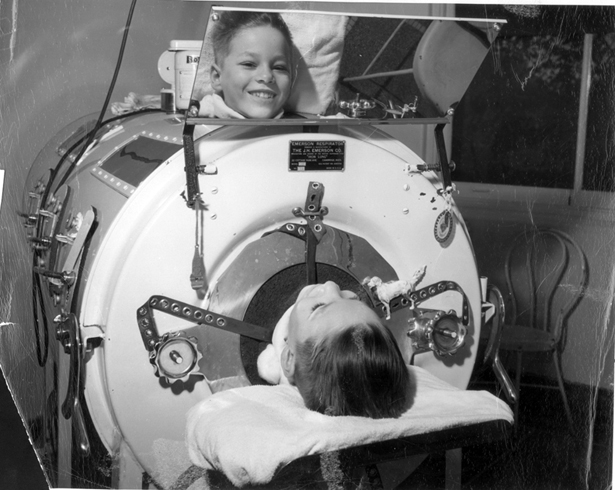 IRON LUNGS: Before there was a vaccine for polio, patients were placed inside of the iron lungs, which simulated breathing.
IRON LUNGS: Before there was a vaccine for polio, patients were placed inside of the iron lungs, which simulated breathing. -
2.
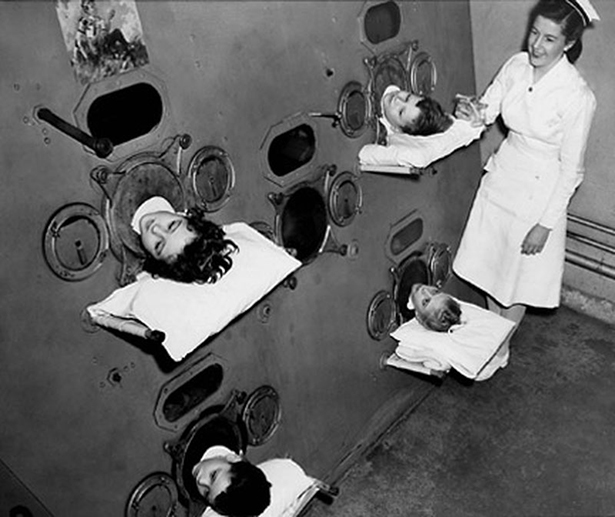 Once inside what looks like a medieval torture device, the patient would be unable to move for weeks on end, seeing only their reflection in the mirror and only being able to speak when the machine exhaled.
Once inside what looks like a medieval torture device, the patient would be unable to move for weeks on end, seeing only their reflection in the mirror and only being able to speak when the machine exhaled. -
3.
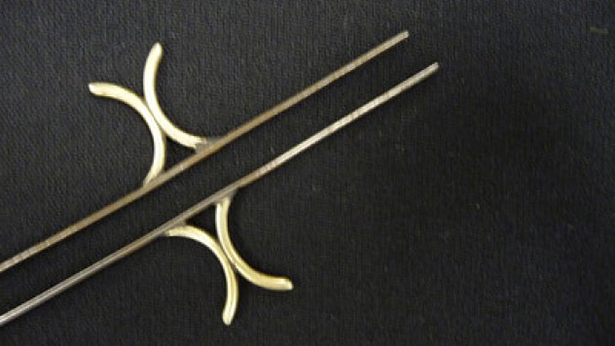 STRICTURE DIVULSOR: MUCH SCARIER THAN IT SOUNDS If a males urethra became too narrow for proper urine flow, doctors would insert a divulsor into the top of the penis. Then, a screw was turned to separate the blades and widen the urethra bleeding was considered a good sign.
STRICTURE DIVULSOR: MUCH SCARIER THAN IT SOUNDS If a males urethra became too narrow for proper urine flow, doctors would insert a divulsor into the top of the penis. Then, a screw was turned to separate the blades and widen the urethra bleeding was considered a good sign. -
4.
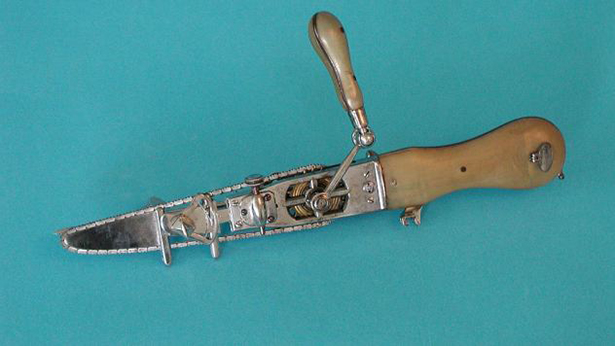 OSTEOTOME: In an attempt to cure headaches, doctors would use a technique called trepanning to drill a hole into a patients skull. The Osteotome a terrifying type of chainsaw was used to drill said hole. Thankfully, we have paracetamol now.
OSTEOTOME: In an attempt to cure headaches, doctors would use a technique called trepanning to drill a hole into a patients skull. The Osteotome a terrifying type of chainsaw was used to drill said hole. Thankfully, we have paracetamol now. -
5.
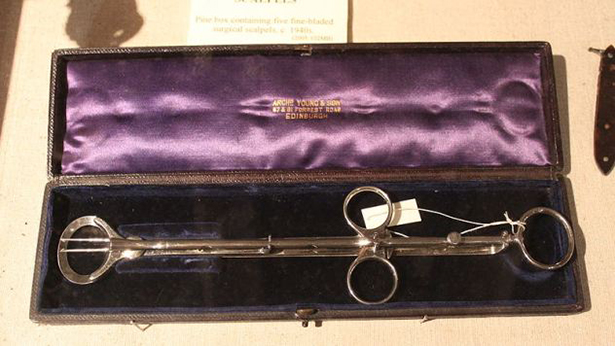 TONSIL GUILLOTINE: Before antibiotics, tonsillitis was life threatening. To avoid getting their fingers bitten by their conscious patients, doctors would shove a terrifying guillotine down unsuspecting throats. Just like its neck-sized counterpart, it proved rather efficient in severing tissue.
TONSIL GUILLOTINE: Before antibiotics, tonsillitis was life threatening. To avoid getting their fingers bitten by their conscious patients, doctors would shove a terrifying guillotine down unsuspecting throats. Just like its neck-sized counterpart, it proved rather efficient in severing tissue. -
6.
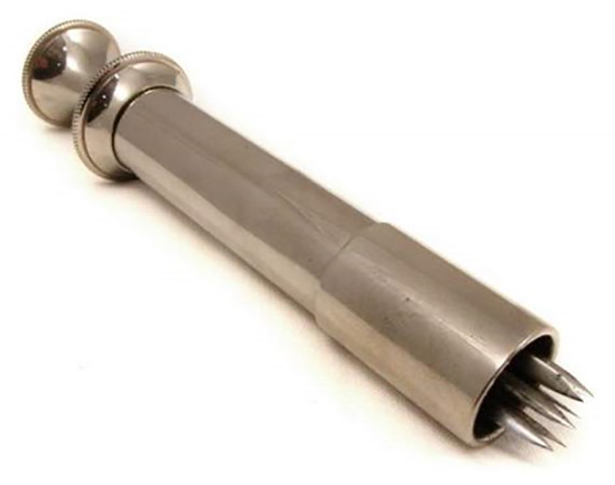 ARTIFICIAL LEECH: When a doctor didnt have leeches, they used the artificial leech. The rotating blades would cut a wound in the patients skin, while the cylinder would be used to produce a vacuum that sucked up the blood.
ARTIFICIAL LEECH: When a doctor didnt have leeches, they used the artificial leech. The rotating blades would cut a wound in the patients skin, while the cylinder would be used to produce a vacuum that sucked up the blood. -
7.
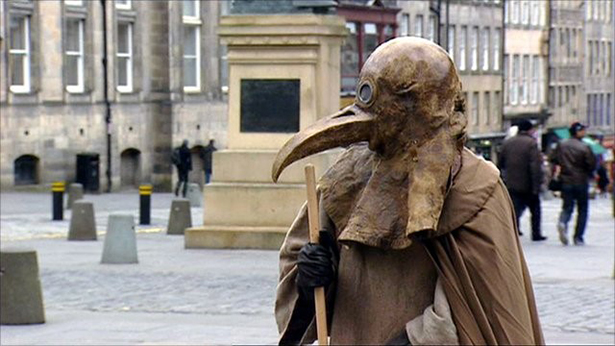 PLAGUE DOCTORS: Well into the 1800s, these terrifying plague doctors were often called in to treat outbreaks of the bubonic plague. To protect themselves, they wore creepy masks with long beaks and then filled them with flowers, believing that disease was spread through smell. Their treatments included lashings because the plague was often seen as a punishment from God and bleeding the patient dry with leeches.
PLAGUE DOCTORS: Well into the 1800s, these terrifying plague doctors were often called in to treat outbreaks of the bubonic plague. To protect themselves, they wore creepy masks with long beaks and then filled them with flowers, believing that disease was spread through smell. Their treatments included lashings because the plague was often seen as a punishment from God and bleeding the patient dry with leeches. -
8.
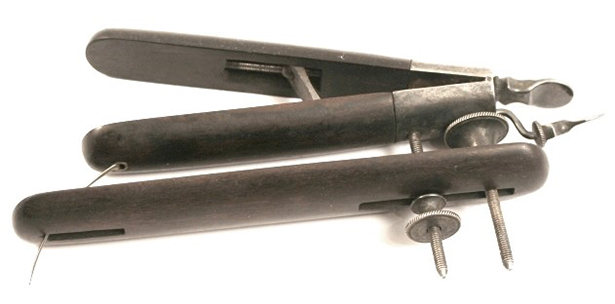 HEMORRHOID FORCEPS: If you suffered from hemorrhoids in the past, you had to put up with it. Unless, they got so bad that you couldnt suffer them any longer. This lovely tool would tightly grasp and crush external hemorrhoids to restrict blood flow and cause them to fall off. Internal hemorrhoids would be pulled out by a hook, naturally.
HEMORRHOID FORCEPS: If you suffered from hemorrhoids in the past, you had to put up with it. Unless, they got so bad that you couldnt suffer them any longer. This lovely tool would tightly grasp and crush external hemorrhoids to restrict blood flow and cause them to fall off. Internal hemorrhoids would be pulled out by a hook, naturally. -
9.
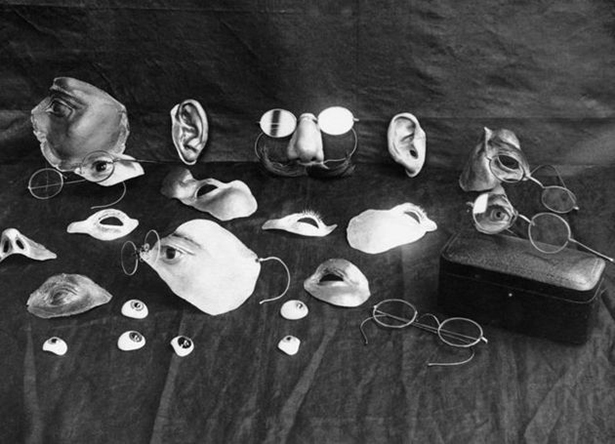 EARLY PLASTIC SURGERY: It may be hard to believe, but basic plastic surgery has been around since ancient times. However. up until recently, it was extremely basic.
EARLY PLASTIC SURGERY: It may be hard to believe, but basic plastic surgery has been around since ancient times. However. up until recently, it was extremely basic. -
10.
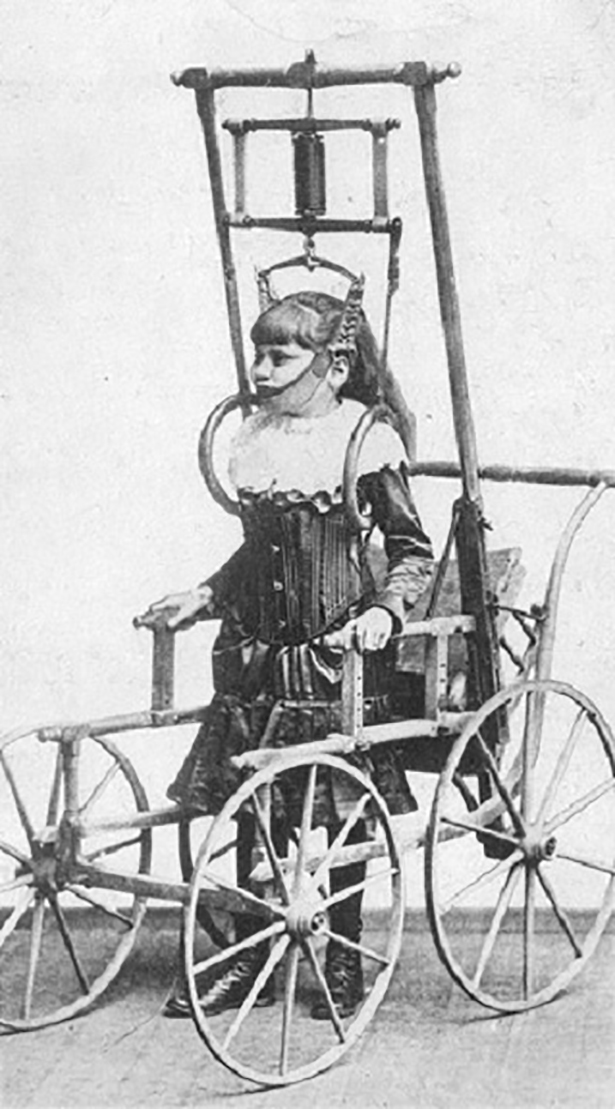 EARLY WHEELCHAIRS: Dr Clarks Spinal Apparatus was advertised in 1878 as allowing people with spinal issues to walk for a few minutes or even hours a day. In actuality, the wooden frame on this terrifying device was so heavy that a medically fit person could barely move an inch, let alone those with spinal issues.
EARLY WHEELCHAIRS: Dr Clarks Spinal Apparatus was advertised in 1878 as allowing people with spinal issues to walk for a few minutes or even hours a day. In actuality, the wooden frame on this terrifying device was so heavy that a medically fit person could barely move an inch, let alone those with spinal issues. -
11.
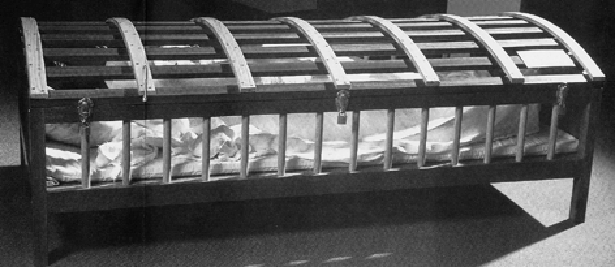 THE UTICA CRIB: Mostly used in mental hospitals, the Utica Crib stopped patients from walking, sitting or moving. By the 20th century, these cruel cages were abolished and replaced with restraints, straitjackets and padded rooms.
THE UTICA CRIB: Mostly used in mental hospitals, the Utica Crib stopped patients from walking, sitting or moving. By the 20th century, these cruel cages were abolished and replaced with restraints, straitjackets and padded rooms. -
12.
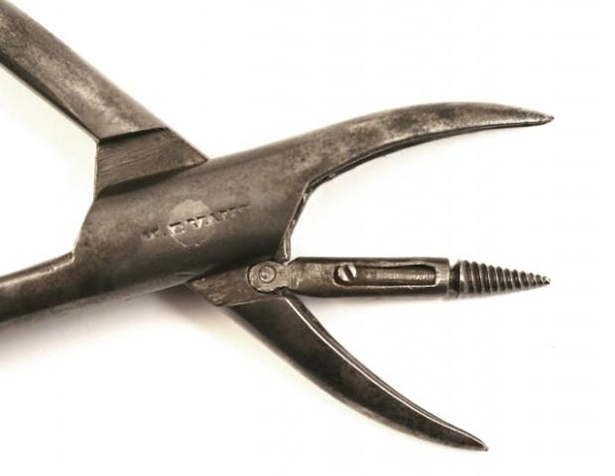 DENTAL SCREW FORCEPS: The central screw on this device would drill down into the tooth whilst held in place by the blades, making extraction easier. Of course, this was before the invention of anaesthetic
DENTAL SCREW FORCEPS: The central screw on this device would drill down into the tooth whilst held in place by the blades, making extraction easier. Of course, this was before the invention of anaesthetic -
13.
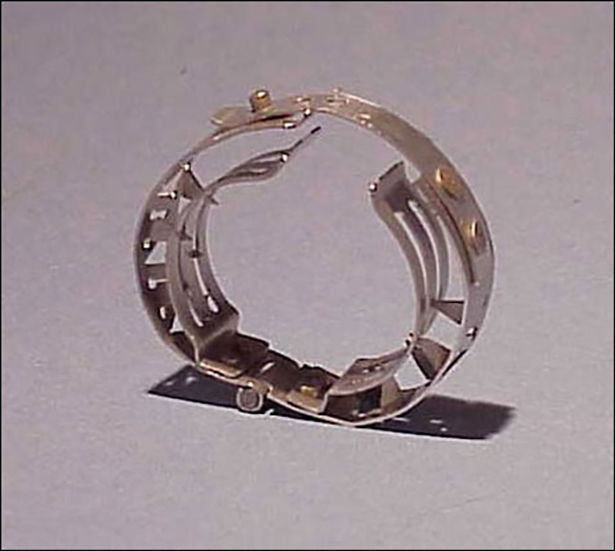 SPERMATORRHEA RING: During the Victorian era, masturbation was seen as unhealthy. In an attempt to stop the practice amongst men, doctors invented the spermatorrhea. Fitted around the penis, every time a man got a little too sexually excited, the sharp spikes would kill the mood.
SPERMATORRHEA RING: During the Victorian era, masturbation was seen as unhealthy. In an attempt to stop the practice amongst men, doctors invented the spermatorrhea. Fitted around the penis, every time a man got a little too sexually excited, the sharp spikes would kill the mood. -
14.
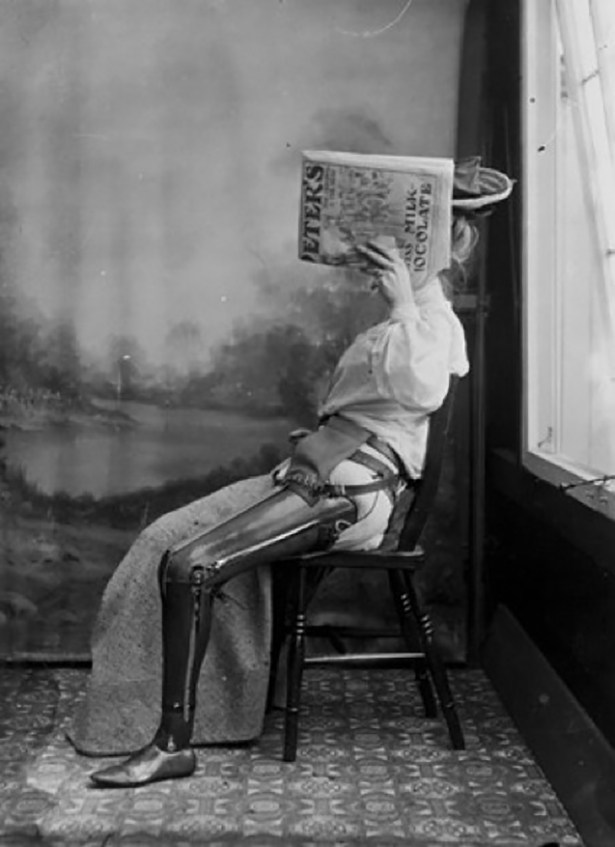 EARLY PROSTHETICS: Prosthetics have been referenced as far back as ancient Egypt.
EARLY PROSTHETICS: Prosthetics have been referenced as far back as ancient Egypt. -
15.
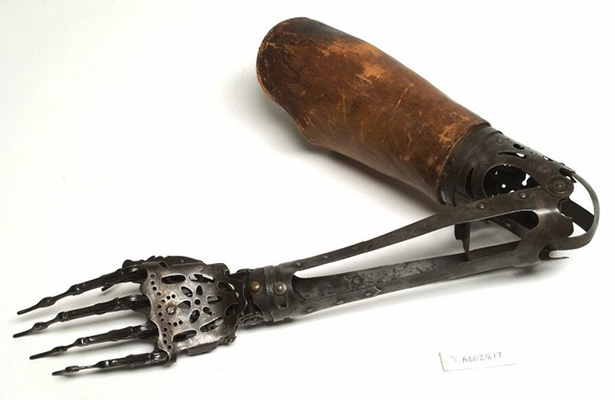 Until more modern times, most looked like something out of a steampunk world, were uncomfortable, impractical, and often embarrassed and ashamed the owner.
Until more modern times, most looked like something out of a steampunk world, were uncomfortable, impractical, and often embarrassed and ashamed the owner. -
16.
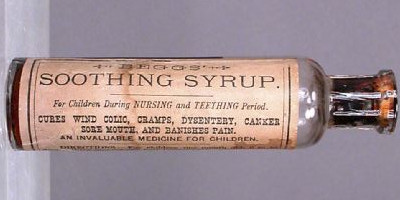 Children's Soothing Syrups: To aide the stressed 19th-century mother, a series of "soothing syrups," lozenges and powders were created, all which were carefully formulated to ensure they were safe for use by those most vulnerable members of the family.
Children's Soothing Syrups: To aide the stressed 19th-century mother, a series of "soothing syrups," lozenges and powders were created, all which were carefully formulated to ensure they were safe for use by those most vulnerable members of the family. -
17.
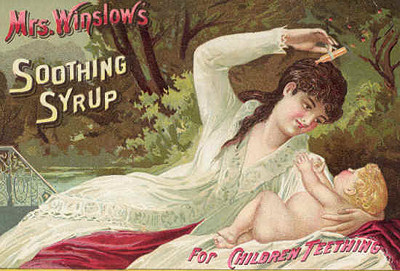 Actually, they pumped each bottle full of as many narcotics as it could hold.For instance, each ounce of Mrs. Winslow's Soothing Syrup contained 65 mg of pure morphine.
Actually, they pumped each bottle full of as many narcotics as it could hold.For instance, each ounce of Mrs. Winslow's Soothing Syrup contained 65 mg of pure morphine. -
18.
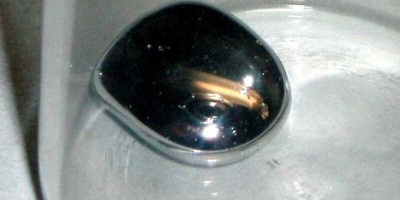 The Curative Powers of Mercury: Mercury was used to treat pretty much anything and everything. Scraped your knee? Just rub a little mercury on it. Having some problems with regularity? Forget fiber, time to get some mercury up in there! If you lived more than 100 years ago, you simply weren't considered healthy if you weren't leaking silver from at least one orifice.
The Curative Powers of Mercury: Mercury was used to treat pretty much anything and everything. Scraped your knee? Just rub a little mercury on it. Having some problems with regularity? Forget fiber, time to get some mercury up in there! If you lived more than 100 years ago, you simply weren't considered healthy if you weren't leaking silver from at least one orifice. -
19.
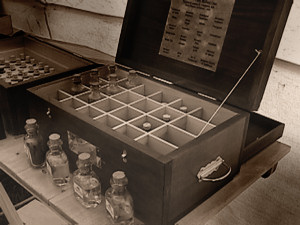 Symptoms of mercury poisoning include chest pains, heart and lung problems, coughing, tremors, violent muscle spasms, psychotic reactions, delirium, hallucinations, suicidal tendencies, restless spleen syndrome
Symptoms of mercury poisoning include chest pains, heart and lung problems, coughing, tremors, violent muscle spasms, psychotic reactions, delirium, hallucinations, suicidal tendencies, restless spleen syndrome -
20.
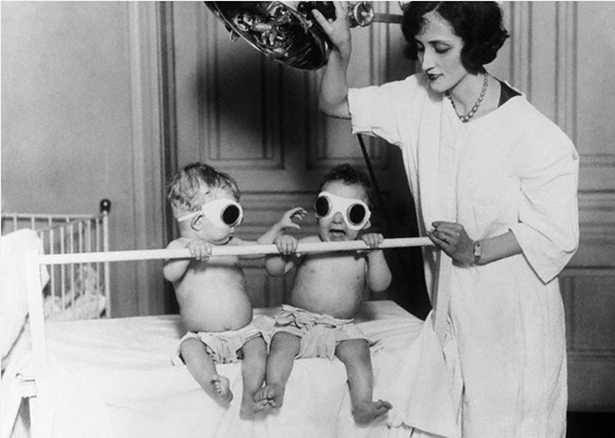 BABY TANNING STATIONS: Winter rickets is a disorder caused by lack of vitamin D, which leads to the weakening of bones. Now, sufferers are usually prescribed vitamin D supplements.
BABY TANNING STATIONS: Winter rickets is a disorder caused by lack of vitamin D, which leads to the weakening of bones. Now, sufferers are usually prescribed vitamin D supplements. -
21.
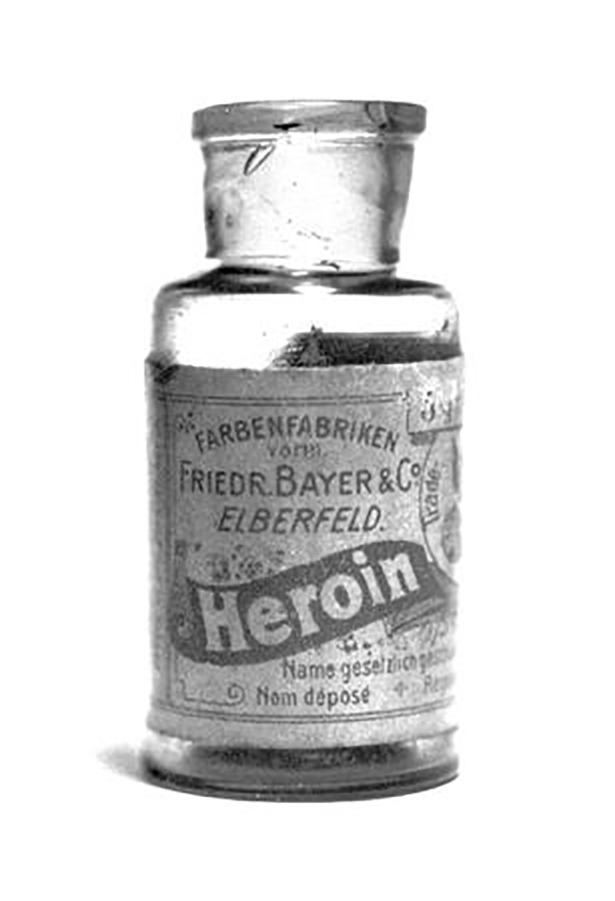 HEROIN AND COCAINE COUGH SYRUP: Before their addictive properties were discovered, both heroin and cocaine were used to dull pain. For a few years, heroin made it into cough syrup until Bayer the same company that bought us aspirin discovered the addictive nature of their medicine.
HEROIN AND COCAINE COUGH SYRUP: Before their addictive properties were discovered, both heroin and cocaine were used to dull pain. For a few years, heroin made it into cough syrup until Bayer the same company that bought us aspirin discovered the addictive nature of their medicine. -
22.
 Calm Your Cough with Heroin: Heroin, by the way, was originally developed by Bayer.
Calm Your Cough with Heroin: Heroin, by the way, was originally developed by Bayer. -
23.
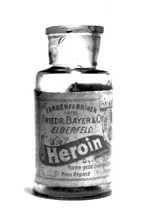 Bayer used to be called IG Farben, a pharmaceutical and chemical conglomerate that allegedly sponsored experiments by Nazi torturers.
Bayer used to be called IG Farben, a pharmaceutical and chemical conglomerate that allegedly sponsored experiments by Nazi torturers. -
24.
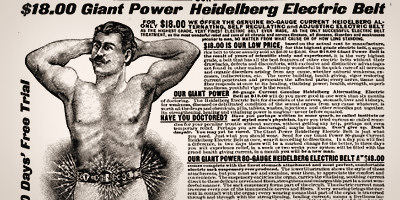 Electrical Impotence Cures: Electrified beds, elaborate cock shocking electric belts and other strange devices were advertised
Electrical Impotence Cures: Electrified beds, elaborate cock shocking electric belts and other strange devices were advertised -
25.
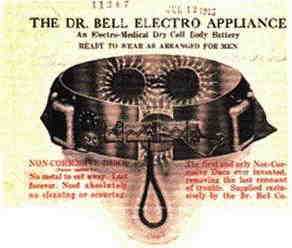 The late 19th century, the wonders of electricity became to be known to the common person.
The late 19th century, the wonders of electricity became to be known to the common person. -
26.
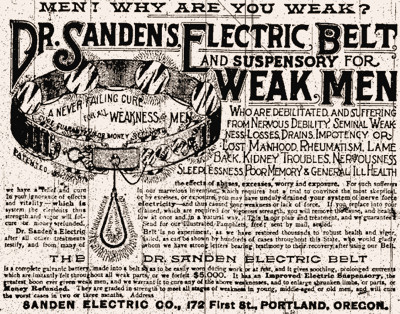 What's fascinating is that you can find ads for more than one brand of electric dick-shock belt.
What's fascinating is that you can find ads for more than one brand of electric dick-shock belt. -
27.
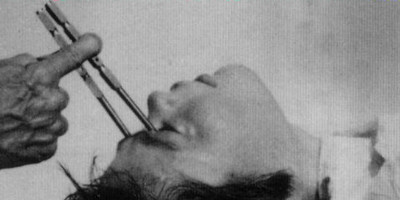 Lobotomies: Lobotomies were a popular fad for the first half of the 20th century and were floated as a "cure" for pretty much any mental issue you can name, from conditions as serious as schizophrenia to something as mild as depression or anxiety.
Lobotomies: Lobotomies were a popular fad for the first half of the 20th century and were floated as a "cure" for pretty much any mental issue you can name, from conditions as serious as schizophrenia to something as mild as depression or anxiety. -
28.
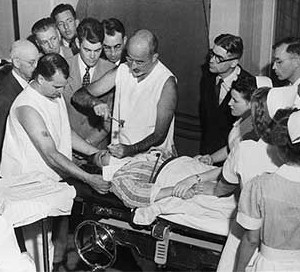 The inventor of the lobotomy was given a Nobel Prize for it in 1949. Doctors claimed the "ice-pick-to-the- freaking-eye" method of lobotomy would be as quick and easy as a trip to the dentist
The inventor of the lobotomy was given a Nobel Prize for it in 1949. Doctors claimed the "ice-pick-to-the- freaking-eye" method of lobotomy would be as quick and easy as a trip to the dentist
- REPLAY GALLERY
-

- Medical Procedures We Used To Think Were A Good Idea
- NEXT GALLERY
-
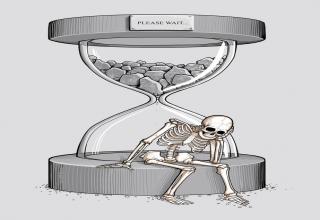
- 25 Drawings With Twisted Perspectives
IRON LUNGS: Before there was a vaccine for polio, patients were placed inside of the iron lungs, which simulated breathing.
28/28
1/28


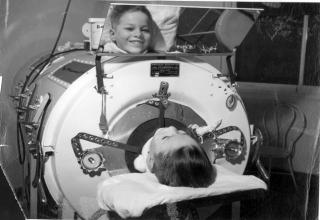




226 Comments